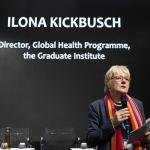In addition to the tragic loss of lives, the recent Ebola outbreak in West Africa has had serious implications for human security and economic development in the affected countries. Drawing on what many have considered to be an inadequate response by many actors, the instruments that local communities, national governments, regional organisations, and the international community have at their disposal to address such crises need to be reviewed. Will lessons from the Ebola epidemic be learnt, and will they trigger new synergies and action that are capable of preventing a future crisis?
For the health and security communities the Ebola crisis might well have been a long-overdue wake-up call to overcome their hesitation in creating early and lasting synergies to be better prepared for future health crises. There is no time and space for misplaced reservations about closer collaboration between health, humanitarian, development, and security actors. If well-designed and prepared, there is little doubt that joint efforts can be put in place to trigger meaningful and effective prevention and response mechanisms. This is especially the case as advances in creating accountable and effective security sectors, owned and governed by the societies they serve, as well as the recognition of the grave human, national and cross-border security repercussions of poverty, suffering and disease by health, humanitarian, and development actors, have created an ideal backdrop for urgent rapprochement between these communities.
Little systematic discussion has taken place – and even less systematic research has been undertaken – to explore such collaborative efforts. This event is jointly organised by the Global Health Programme and the Geneva Centre for the Democratic Control of Armed Forces and is designed to complement the discussions at the World Health Assembly (WHA), add a security sector perspective to the debate, and hopefully give further stimulus to building synergies between the health and the security sectors. The interface of these communities will be introduced by Laurie Garrett, with short inputs by several foreign policy experts. The audience will be invited to actively join this debate and help in identifying constructive ways to effectively prevent and respond to global health crises – a joint investment in broader and better global health security.
The event is sponsored by the Swiss Federal Department of Foreign Affairs and the Swiss Department of Defense.
Event materials
Background materials
-
Security Sector Engagement in Global Health Crises. A Brief for Policy-MakersGHP and DCAF, 2015
-
Video: Finland as Chair of the Global Health Security Agenda (GHSA) Steering Group 2015
Videos
Welcome and opening remarks
Ilona Kickbusch, Director, Global Health Programme, the Graduate Institute
Theodor Winkler, Ambassador and Director, Geneva Centre for the Democratic Control of Armed Forces (DCAF)
Keynote Address
Laurie Garrett, Senior Fellow for Global Health, Council on Foreign Relations
Päivi Kairamo, Ambassador and Permanent Representative, Permanent Mission of Finland to the United Nations Office and other international organizations in Geneva
Jonathan Sandy, Principal Founder and Executive Director, JS & Associates Centre for Governance and Security Policy Initiative;Senior Stabilization Adviser, African Union Peace and Security Department
Closing remarks
Theodor Winkler, Ambassador and Director, Geneva Centre for the Democratic Control of Armed Forces (DCAF)




